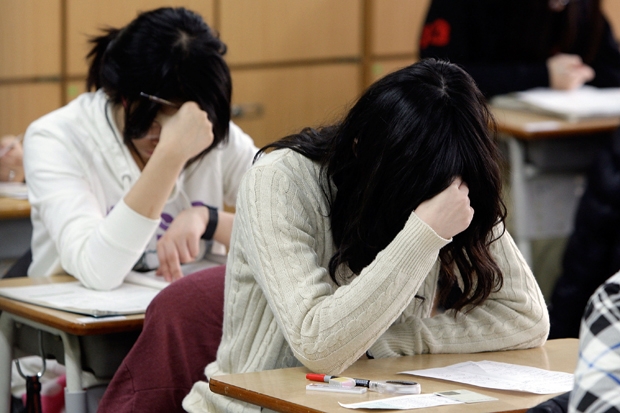South Korea’s education system puts us to shame. Last year the BBC tested a group of 15- and 16-year-olds with some questions from a GCSE maths paper; they all finished in half the time allowed, four scored 100 per cent and the other two dropped one mark. It’s the kind of performance most British teachers and parents can only dream of, so at first it’s surprising that a London girls’ school has opened up a branch in South Korea. The North London Collegiate (NLCS) is one of Britain’s top schools, but it still looked like they were going to have a lot of competition on their hands when they chose South Korea for their first international franchise. Three years ago they opened up a co-educational school on Jeju island off the south coast of Korea, and they’ve just had their first sixth-formers’ exam results.
It was the Korean government who invited NLCS to set up in Jeju, because they were worried about a brain drain. More and more children were being sent away; in 2007 more than 20,000 Korean children were at school abroad. The nation’s extraordinary proficiency in maths and science comes at a price: teenagers regularly spend 13 or 14 hours a day studying, dutifully going off every day to after-school classes, known as hagwons. They’re all competing to get into three universities and it leaves a lot of teenagers stressed and sleep-deprived. The national exam fever has been linked to Korea’s high suicide rate among young people.
The drudgery and the pressure of Korean students’ life is a far cry from the sunny, end-of-term atmosphere I find when I visit the North London Collegiate in Stanmore in Middlesex. Lawns dotted with rose bushes and shaded by cedar trees stretch into tennis courts with a folly beyond. Three or four teenagers are sprawled on the grass, one of them wearing fairy wings. They’ve just had their end-of-term sketch show where some of them have been doing impressions of the deputy headmaster, Daniel Lewis, who I’m here to meet. As I wait in an elegant, airy hall, a 17-year-old bounds in and announces to her father: ‘She’s making me read Mill on the Floss or Great Expectations!’ She’s pretending to complain but she’s evidently delighted with the commission. There’s a relaxed feeling here at the moment, but there’s ambition everywhere. ‘Go for Mill on the Floss,’ the girl’s father says. ‘This lady’s from The Spectator and you want to be a journalist; introduce yourself, send her your CV, maybe set up some work experience.’ On the walls are framed biographies and pictures of successful alumni, like Anna Wintour, Rachel Weisz and Stevie Smith.
It’s this kind of cachet that helps to persuade South Korean parents that they can afford to take their children out of the rat race. ‘South Korea is very strong in maths and science, but they’ve only ever had one Nobel laureate,’ says Daniel Lewis. ‘A lot of parents are looking for a different kind of education for their children.’
He remembers one mother coming to look round and she asked how her child would have time to go to the hagwon. When staff explained that he wouldn’t be going to a hagwon, she started crying with relief. In a recent application to become a prefect, one pupil reflected on the differences between NLCS Jeju and his previous school: ‘I still remember Mr Schofield’s bright smile greeting us at the front gate,’ he wrote. ‘In this school, understanding things is much more important than memorising. What is really important is whether you really enjoy learning.’
Of course, all this jolliness means the pupils wouldn’t stand a chance in the national exam, so instead they take the International Baccalaureate and then mostly apply for British or American universities. There may still be a brain drain, says Lewis, but at least they’re staying longer; some of the pupils he has interviewed are nine years old and already at boarding schools in Europe. At the Jeju school, pupils don’t lose touch with Korean culture; lessons are mostly in English, but there are Korean lessons in language, literature, history and sociology.
There’s also as much extracurricular activity laid on as possible, which is a novelty for most students. ‘They’re all really up for it,’ says Lewis. ‘They don’t know what they can’t do, and they develop confidence by trying things.’ But in a culture where exam results are everything, parents sometimes find it hard to see why the school is taking their children on a sailing trip or giving them a part in a musical. ‘It’s a big leap of faith for parents to send their children to us,’ says Lewis. ‘They’re used to numbers all the time and there’s a constant pressure for more data.’ In this year’s exams, the school did well, scoring an average 36 points, which is equivalent to Singapore, the highest performing jurisdiction for the IB. Lewis is confident that the results will persuade more parents to send their children to Jeju, but more than anything, he’s proud of the atmosphere they have created there. ‘There’s already a groundswell of support and understanding about what we’re trying to do,’ he says. ‘They just see that the children are happy.’






Comments